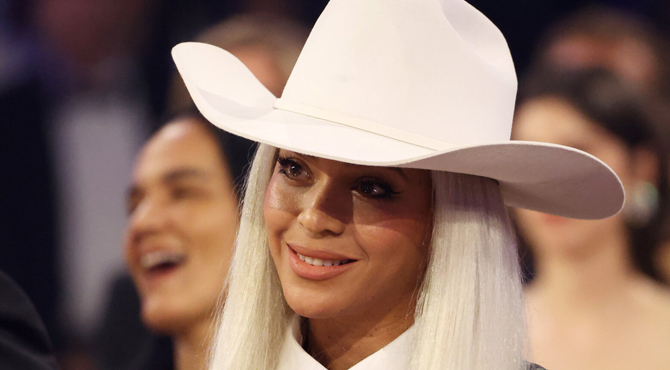An Oklahoma country radio station faced serious backlash from its listeners, and people around the world, after refusing to play Beyoncé’s new country single, “Texas Hold ‘Em”
One listener, who requested the song but was told “We do not play Beyoncé on KYKC as we are a country music station,” started a revolution.
Keep reading to learn what this fan, of the “Beyhive” clan, did to hear his “Queen Bey.”
On February 11, 2024 – Super Bowl Sunday – Beyoncé released “Texas Hold ‘Em” alongside another single titled “16 Carriages,” offering a preview of her venture into the country music genre.
The circus of controversy started the next day, when a 100.1 KYKC listener, known as Justin or @jussatto on X (formerly Twitter), requested the song, which is part of Beyoncé’s upcoming album, “Act II” of her three-part “Renaissance” project.
Instead of playing the song, the country music radio station in Ada, Oklahoma denied Justin’s email request with a response that says: “We do not play Beyoncé on KYKC as we are a country music station.”
After Justin’s request was denied, he tweeted a screenshot of the station’s reply to the Beyhive community, which fueled a storm of fury.
What happened next
“This station needs to be held accountable for their blatant racism and discrimination against Beyoncé,” the listener wrote on X. “@1001KYKC This is absolutely ridiculous and racist. You guys should be ashamed. I grew up listening to your station.”
He added, “PLEASE EMAIL THE RADIO STATION TO REQUEST THE SONG. score@scoreradio.net.” Online users, namely Beyhivers, replied to the thread with outrage.
I requested Texas Hold ‘Em at my local country radio station (KYKC) and after requesting, i received an email from the radio station stating “We do not play Beyoncé on KYKC as we are a country music station. @BeyLegion pic.twitter.com/eQksQemk6m
— JUSTIN 🫧 (@jussatto) February 13, 2024
“Beyoncé can get them millions of new listeners onto country music, but they want to be prideful, let ‘em know Beyhive,” writes one calling out for support from other Beyoncé fans.
“I’m all the way in Botswana but I’m sending in that email. No to discrimination,” adds another to the post that had 3.4 million views.
A third netizen writes, “I’m guesting KYKC is pretty serious about their country music. But I can’t blame [fans] for requesting Beyoncé, she’s one of the most iconic and influential artists of our time. And KYKC might be missing out on some great music if they’re not open to expanding their playlist!”
Next, offering a bit of history, another user tweets: “[KYKC] rejected the fans’ request based of the discriminating thought that Beyoncé does not belong on a “country radio station,’” it read in part. “It’s time to acknowledge where country music really came from, because it’s a part of Black history. Now pay respect to it.”
The netizen is not wrong.
Time, pulling from a 2013 essay, “Black Hillbillies: African American Musicians on Old-Time Records, 1924-1932,” writes that almost 50 African-American singers and musicians “appeared on commercial hillbilly records between those years…a fluid phenomenon passed back and forth between the races.”
The story explains that in the 1920s, commercialization of hillbilly music led record labels to categorize releases into distinct genres known as “hillbilly records” and “race records.” This was based on the assumption that consumers made purchasing decisions according to racial identities.
PLEASE EMAIL THE RADIO STATION TO REQUEST THE SONG.
score@scoreradio.net
— JUSTIN 🫧 (@jussatto) February 13, 2024
Black performers featured on hillbilly records were often scrubbed from credits and in images, they were replaced by white stand-ins.
The marketing strategy of cataloging music into hillbilly and race had significant consequences, pushing many black artists to the margins of country music.
Unaware Beyoncé crossed genres
Meanwhile, as the Tweet continued to hit the eyes of media and online users around the world, another user pondered, “Don’t kill me but why allude to racism. What if they just simply [weren’t] aware that Beyoncé tapped into country music?”
After the backlash, the station, admitting it received thousands of emails and phone calls, agreed that it would play the song. It also admitted to not knowing Beyoncé crossed into a new genre.
“We initially refused to play it in the same manner if someone requested us to play the Rolling Stones on our country station,” Roger Harris, the general manager, writes in a statement.
Explaining the station didn’t even have the song, he continues “But…finally we got our hands on it, and based on the fan support, we decided to air it…truthfully, normally we would (usually) wait a while to see how the song performs on the charts and on bigger country stations than ours, as we are just the little guys.”
He concludes, “We love Beyoncé. We just didn’t know about the song…We just were behind this country music changeover…But, now that she’s coming out as a country artist, we want to be all over it…we are not fools…we know how big she is and we are happy to air it and wish her the best success.”
This story really underscores the power of social media. Kudos to Justin for fighting for what he believes!
What do you think of Beyoncé’s new country song? Please let us know in the comment section below and then share this story so we can hear what others have to say!
